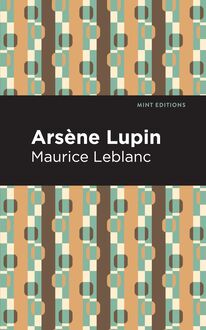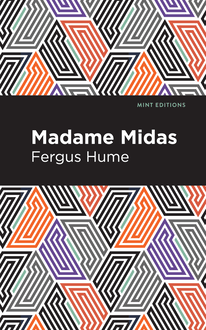-
 Univers
Univers
-
 Ebooks
Ebooks
-
 Livres audio
Livres audio
-
 Presse
Presse
-
 Podcasts
Podcasts
-
 BD
BD
-
 Documents
Documents
-
- Cours
- Révisions
- Ressources pédagogiques
- Sciences de l’éducation
- Manuels scolaires
- Langues
- Travaux de classe
- Annales de BEP
- Etudes supérieures
- Maternelle et primaire
- Fiches de lecture
- Orientation scolaire
- Méthodologie
- Corrigés de devoir
- Annales d’examens et concours
- Annales du bac
- Annales du brevet
- Rapports de stage
La lecture à portée de main
Vous pourrez modifier la taille du texte de cet ouvrage
Découvre YouScribe en t'inscrivant gratuitement
Je m'inscrisDécouvre YouScribe en t'inscrivant gratuitement
Je m'inscrisEn savoir plus
Vous pourrez modifier la taille du texte de cet ouvrage
En savoir plus

Description
The Black Robe (1881) is a novel by Wilkie Collins. Written toward the end of Collins’ career, The Black Robe shows brilliant flashes of the author’s trademark sense of mystery and psychological unease, which made him a household name around the world. Recognized as an important Victorian novelist and pioneer of detective fiction, Wilkie Collins was a writer with a gift for thoughtful entertainment, stories written for a popular audience that continue to resonate with scholars and readers today. While visiting northern France to attend the funeral of his aunt, Lewis Romayne, while playing cards, accuses a local gambler of cheating. Offended by the young Englishman, the man challenges Romayne to a duel, but sends his son in his place. Against the odds, Romayne—unaccustomed to fighting—manages to kill the boy, saving his own life. The screams of his younger brother, however, never leave Romayne, not as he returns to Yorkshire a changed man, not for the rest of his life. Back home, he attempts to regain a sense of normalcy, caring for Vange Abbey, the family estate, and making social trips to London. In the city, he meets and falls in love with the beautiful Stella Eyrecourt, whom he marries. Meanwhile, a vindictive priest looking to gain control of the Abbey hatches a plan to convert Romayne to Catholicism and trick him into signing the property over in his will. Wracked with guilt and trusting to a fault, Romayne walks right into his trap. Beyond its sensational plot, The Black Robe is a masterpiece of mystery and social critique for seasoned readers of Victorian fiction and newcomers alike. With a beautifully designed cover and professionally typeset manuscript, this edition of Wilkie Collins’ The Black Robe is a classic work of English literature reimagined for modern readers.
Sujets
Informations
| Publié par | Mint Editions |
| Date de parution | 21 mai 2021 |
| Nombre de lectures | 0 |
| EAN13 | 9781513287263 |
| Langue | English |
| Poids de l'ouvrage | 3 Mo |
Informations légales : prix de location à la page 0,0500€. Cette information est donnée uniquement à titre indicatif conformément à la législation en vigueur.
Extrait
The Black Robe
Wilkie Collins
The Black Robe was first published in 1881.
This edition published by Mint Editions 2021.
ISBN 9781513282244 | E-ISBN 9781513287263
Published by Mint Editions ®
minteditionbooks .com
Publishing Director: Jennifer Newens
Design & Production: Rachel Lopez Metzger
Project Manager: Micaela Clark
Typesetting: Westchester Publishing Services
C ONTENTS B EFORE THE S TORY F IRST S CENE .—B OULOGNE -S UR -M ER .—T HE D UEL S ECOND S CENE .—V ANGE A BBEY .—T HE F OREWARNINGS T HE S TORY B OOK THE F IRST I. T HE C ONFIDENCES II. T HE J ESUITS III. T HE I NTRODUCTION TO R OMAYNE IV. F ATHER B ENWELL H ITS V. F ATHER B ENWELL M ISSES VI. T HE O RDER OF THE D ISHES VII. T HE I NFLUENCE OF S TELLA VIII. T HE P RIEST OR THE W OMAN ? IX. T HE P UBLIC AND THE P ICTURES X. F ATHER B ENWELL ’ S C ORRESPONDENCE XI. S TELLA A SSERTS H ERSELF XII. T HE G ENERAL ’ S F AMILY XIII. F ATHER B ENWELL ’ S C ORRESPONDENCE B OOK THE S ECOND I. T HE S ANDWICH D ANCE II. T HE Q UESTION OF M ARRIAGE III. T HE E ND OF THE B ALL IV. I N THE S MALL H OURS B OOK THE T HIRD I. T HE H ONEYMOON II. E VENTS AT T EN A CRES III. F ATHER B ENWELL AND THE B OOK IV. T HE E ND OF THE H ONEYMOON V. F ATHER B ENWELL ’ S C ORRESPONDENCE B OOK THE F OURTH I. T HE B REACH IS W IDENED II. A C HRISTIAN J ESUIT III. W INTERFIELD R ETURNS IV. F ATHER B ENWELL ’ S C ORRESPONDENCE V. B ERNARD W INTERFIELD ’ S C ORRESPONDENCE VI. T HE S ADDEST OF A LL W ORDS VII. T HE I MPULSIVE S EX VIII. F ATHER B ENWELL ’ S C ORRESPONDENCE B OOK THE F IFTH I. M RS . E YRECO U RT ’ S D ISCOVERY II. T HE S EED IS S OWN III. T HE H ARVEST IS R EAPED IV. O N THE R OAD TO R OME A FTER THE S TORY E XTRACTS FROM B ERNARD W INTERFIELD ’ S D IARY
BEFORE THE STORY
F IRST S CENE .—B OULOGNE -S UR -M ER .—T HE D UEL
I
T HE DOCTORS COULD DO NO more for the Dowager Lady Berrick.
When the medical advisers of a lady who has reached seventy years of age recommend the mild climate of the South of France, they mean in plain language that they have arrived at the end of their resources. Her ladyship gave the mild climate a fair trial, and then decided (as she herself expressed it) to “die at home.” Traveling slowly, she had reached Paris at the date when I last heard of her. It was then the beginning of November. A week later, I met with her nephew, Lewis Romayne, at the club.
“What brings you to London at this time of year?” I asked.
“The fatality that pursues me,” he answered grimly. “I am one of the unluckiest men living.”
He was thirty years old; he was not married; he was the enviable possessor of the fine old country seat, called Vange Abbey; he had no poor relations; and he was one of the handsomest men in England. When I add that I am, myself, a retired army officer, with a wretched income, a disagreeable wife, four ugly children, and a burden of fifty years on my back, no one will be surprised to hear that I answered Romayne, with bitter sincerity, in these words:
“I wish to heaven I could change places with you!”
“I wish to heaven you could!” he burst out, with equal sincerity on his side. “Read that.”
He handed me a letter addressed to him by the traveling medical attendant of Lady Berrick. After resting in Paris, the patient had continued her homeward journey as far as Boulogne. In her suffering condition, she was liable to sudden fits of caprice. An insurmountable horror of the Channel passage had got possession of her; she positively refused to be taken on board the steamboat. In this difficulty, the lady who held the post of her “companion” had ventured on a suggestion. Would Lady Berrick consent to make the Channel passage if her nephew came to Boulogne expressly to accompany her on the voyage? The reply had been so immediately favorable, that the doctor lost no time in communicating with Mr. Lewis Romayne. This was the substance of the letter.
It was needless to ask any more questions—Romayne was plainly on his way to Boulogne. I gave him some useful information. “Try the oysters,” I said, “at the restaurant on the pier.”
He never even thanked me. He was thinking entirely of himself.
“Just look at my position,” he said. “I detest Boulogne; I cordially share my aunt’s horror of the Channel passage; I had looked forward to some months of happy retirement in the country among my books—and what happens to me? I am brought to London in this season of fogs, to travel by the tidal train at seven to-morrow morning—and all for a woman with whom I have no sympathies in common. If I am not an unlucky man—who is?”
He spoke in a tone of vehement irritation which seemed to me, under the circumstances, to be simply absurd. But my nervous system is not the irritable system—sorely tried by night study and strong tea—of my friend Romayne. “It’s only a matter of two days,” I remarked, by way of reconciling him to his situation.
“How do I know that?” he retorted. “In two days the weather may be stormy. In two days she may be too ill to be moved. Unfortunately, I am her heir; and I am told I must submit to any whim that seizes her. I’m rich enough already; I don’t want her money. Besides, I dislike all traveling—and especially traveling alone. You are an idle man. If you were a good friend, you would offer to go with me.” He added, with the delicacy which was one of the redeeming points in his wayward character. “Of course as my guest.”
I had known him long enough not to take offense at his reminding me, in this considerate way, that I was a poor man. The proposed change of scene tempted me. What did I care for the Channel passage? Besides, there was the irresistible attraction of getting away from home. The end of it was that I accepted Romayne’s invitation.
II
S HORTLY AFTER NOON , ON THE next day, we were established at Boulogne—near Lady Berrick, but not at her hotel. “If we live in the same house,” Romayne reminded me, “we shall be bored by the companion and the doctor. Meetings on the stairs, you know, and exchanging bows and small talk.” He hated those trivial conventionalities of society, in which, other people delight. When somebody once asked him in what company he felt most at ease? he made a shocking answer—he said, “In the company of dogs.”
I waited for him on the pier while he went to see her ladyship. He joined me again with his bitterest smile. “What did I tell you? She is not well enough to see me to-day. The doctor looks grave, and the companion puts her handkerchief to her eyes. We may be kept in this place for weeks to come.”
The afternoon proved to be rainy. Our early dinner was a bad one. This last circumstance tried his temper sorely. He was no gourmand; the question of cookery was (with him) purely a matter of digestion. Those late hours of study, and that abuse of tea to which I have already alluded, had sadly injured his stomach. The doctors warned him of serious consequences to his nervous system, unless he altered his habits. He had little faith in medical science, and he greatly overrated the restorative capacity of his constitution. So far as I know, he had always neglected the doctors’ advice.
The weather cleared toward evening, and we went out for a walk. We passed a church—a Roman Catholic church, of course—the doors of which were still open. Some poor women were kneeling at their prayers in the dim light. “Wait a minute,” said Romayne. “I am in a vile temper. Let me try to put myself into a better frame of mind.”
I followed him into the church. He knelt down in a dark corner by himself. I confess I was surprised. He had been baptized in the Church of England; but, so far as outward practice was concerned, he belonged to no religious community. I had often heard him speak with sincere reverence and admiration of the spirit of Christianity—but he never, to my knowledge, attended any place of public worship. When we met again outside the church, I asked if he had been converted to the Roman Catholic faith.
“No,” he said. “I hate the inveterate striving of that priesthood after social influence and political power as cordially as the fiercest Protestant living. But let us not forget that the Church of Rome has great merits to set against great faults. Its system is administered with an admirable knowledge of the higher needs of human nature. Take as one example what you have just seen. The solemn tranquillity of that church, the poor people praying near me, the few words of prayer by which I silently united myself to my fellow-creatures, have calmed me and done me good. In our country I should have found the church closed, out of service hours.” He took my arm and abruptly changed the subject. “How will you occupy yourself,” he asked, “if my aunt receives me to-morrow?”
I assured him that I should easily find ways and means of getting through the time. The next morning a message came from Lady Berrick, to say that she would see her nephew after breakfast. Left by myself, I walked toward the pier, and met with a man who asked me to hire his boat. He had lines and bait, at my service. Most unfortunately, as the event proved, I decided on occupying an hour or two by sea fishing.
The wind shifted while we were out, and before we could get back to the harbor, the tide had turned against us. It was six o’clock when I arrived at the hotel. A little open carriage was waiting at the door. I found Romayne impatiently expecting me, and no signs of dinner on the table. He informed me that he had accepted an invitation, in which I was included, and promised to explain everything in the carriage.
Our driver took the road that led toward the High Town. I subordinated my curiosity to my sense of politeness, and asked for news of his aunt’s health.
“She is seriously ill, poor soul,” he said. “I am sorry I spoke so petulantly and so unfairly when we met at the club. The near prospect of death has developed qualities in her nature which I ought to have seen before this. No matter how it may be delayed,
-
 Univers
Univers
-
 Ebooks
Ebooks
-
 Livres audio
Livres audio
-
 Presse
Presse
-
 Podcasts
Podcasts
-
 BD
BD
-
 Documents
Documents
-
Jeunesse
-
Littérature
-
Ressources professionnelles
-
Santé et bien-être
-
Savoirs
-
Education
-
Loisirs et hobbies
-
Art, musique et cinéma
-
Actualité et débat de société
-
Jeunesse
-
Littérature
-
Ressources professionnelles
-
Santé et bien-être
-
Savoirs
-
Education
-
Loisirs et hobbies
-
Art, musique et cinéma
-
Actualité et débat de société
-
Actualités
-
Lifestyle
-
Presse jeunesse
-
Presse professionnelle
-
Pratique
-
Presse sportive
-
Presse internationale
-
Culture & Médias
-
Action et Aventures
-
Science-fiction et Fantasy
-
Société
-
Jeunesse
-
Littérature
-
Ressources professionnelles
-
Santé et bien-être
-
Savoirs
-
Education
-
Loisirs et hobbies
-
Art, musique et cinéma
-
Actualité et débat de société
- Cours
- Révisions
- Ressources pédagogiques
- Sciences de l’éducation
- Manuels scolaires
- Langues
- Travaux de classe
- Annales de BEP
- Etudes supérieures
- Maternelle et primaire
- Fiches de lecture
- Orientation scolaire
- Méthodologie
- Corrigés de devoir
- Annales d’examens et concours
- Annales du bac
- Annales du brevet
- Rapports de stage




















